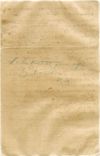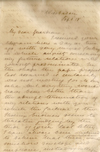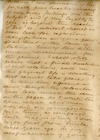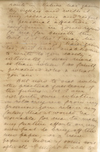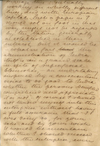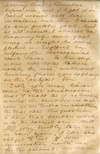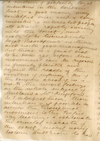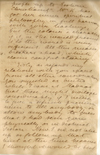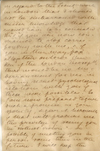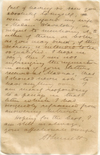Mahatma Letter of Sinnett to/from KH - 1883-09-18
| Quick Facts | |
|---|---|
| People involved | |
| Written by: | Koot Hoomi, A. P. Sinnett |
| Received by: | A. P. Sinnett, Koot Hoomi, H. P. Blavatsky |
| Sent via: | unknown |
| Dates | |
| Written on: | 18 September 1883 |
| Received on: | unknown |
| Other dates: | unknown |
| Places | |
| Sent from: | Wiesbaden |
| Received at: | unknown |
| Via: | unknown |
This letter has not been published previously. A. P. Sinnett wrote to Mahatma Koot Hoomi, who added notes and gave the original to H. P. Blavatsky, with instructions to keep the letter. It falls in the course of their correspondence between Mahatma Letter No. 113 and Mahatma Letter No. 114.
Note to H. P. Blavatsky from K.H.
|
Note written in blue ink across the middle of page 10: To be kept at your office
|
NOTES: |
Page 1 of Sinnett letter transcription, image, and notes
|
My Dear Guardian, I received your telegram here a day or two ago, with very mixed feelings in which anxiety concerning my future relations with yourself predominated. In the shape the paper project last assumed it certainly was not worthy for its own sake, but anything would have been better than the abrupt termination of my relations with you, which the failure of the Phoenix business seems to threaten judging by the tenor of your last letter. I have always been inclined to believe that these relations would somehow develop and improve, instead of collapsing |
NOTES:
|
Page 2
|
because I was conscious of the perfectly pure hearted sincerity of my own feelings on the subject, and of my loyalty to you, as beyond the reach of “tests” &c [et cetera] while I should as soon look for capricious changefullness [sic] on your part as on that of the laws of Nature. Even if this letter remains unanswered – for the present,– I shall still believe that a final dissolution of our relations, even in this physical life is something that cannot take place. In now very different a spirit, though the colourless lines look much the same on the paper, do I write this letter, which absit omen may end our correspondence for a time, as compared with that in which I wrote to you first from Simla three years ago. As my comprehension of your
|
NOTES:
|
Page 3
|
rank in Nature has grown by degrees and with it my reverence and respect so personal affection and confidence in your regard for me (far beneath the level of it tho’ I may be in many ways) have grown too, and have enabled me to write to you easily and intimately, – even more so than when I so faintly perceived who and what you are. But now to deal with the practical questions of the future. For I am not quite sure whether in releasing me from my promise you retain any feeling that it would be desirable for me to make any further efforts on my own part to bring off the new paper, – or a new paper in India of some sort after all. I might be able to |
NOTES:
|
Page 4
|
manage this eventually working on wholly different lines, and with European capital. Such a paper as I should set on foot in that way might not be regarded by the Natives generally as established in their interest, but it would be – what in fact the administration of India itself is on a grand scale in spite of superficial blemishes, – an undertaking inspired by a conscientious desire to do good to India whether the persons benefited comprehend and appreciate it or not. Of course I should not throw myself into this enterprise without having a full assurance that I was doing so, for your sake and by your wish. It would be uncertain whether I should succeed with the enterprise, even |
NOTES: |
Page 5
|
having that stimulus before me, and if I got it on foot it would still be uncertain whether I should do any public good. And at all events I should be throwing up such good doing as might be accomplished in England by helping the Theosophical work there. So the step is one not to be taken rashly by me, without hearing from you explicitly on the subject. For, 2ndly you may have come to the conclusion that I shall be of as much service in London in one way as in India in another[.] In that case the question is how that London work is to be carried on. Will M [three dots] very kindly take me in hand again, if you are obliged to cut off communication with me for the present. We have |
NOTES:
|
Page 6
|
a nucleus of perfectly loyal members in the London Society – a good many very doubtful ones, and a large number of interested people all about, rapidly coming into the Society, and ready to be turned into loyal Theosophists in time and with good management. But there is a great deal to be done yet, before the movement can be regarded as firmly planted and beyond the reach of the disorders of infancy. One of the dangers ahead of us is due to the mixed feelings on the whole subject of Maitland and Mrs Kingsford. As I interpret these [them], their intention is if possible to annex the Theosophical movement to the Perfect Way teachings and obliterate the oriental character of the society, merely using Esoteric Buddhism to lead |
NOTES: |
Page 7
|
people up to Esoteric Christianity. Mrs K. has got her inner spiritual philosophy in full harmony with your teachings but the colour and character of it, as she would present it to the world is very different. All this means breakers ahead, which claim careful steering. 3rdly as regards my relations with you apart from all other considerations you suggested or hinted while I was at Madras that these might develop considerably if I were to give a definite promise never to tell anybody, or allow anybody to guess that I had seen you physically or in distinct vision. Now I did not take up or follow up that hint at the time because I thought it would be best
|
NOTES:
|
Page 8
|
in regard to the Society – work in London that I should not be embarrassed with inner knowledge that would have to be concealed. But if you are now constrained to stop corresponding with me, and if you in this way pass altogether outside the ken of the London Theosoph. there would be no embarrassment for me in having secret psychological relations with you if these were possible. So I am now prepared to give such a promise as you spoke of, and give it herewith if that will procure me the privilege of seeing you in “distinct vision” – as possibly of meeting you in person some time in the future. I will keep the |
NOTES:
|
Page 9
|
fact of having so seen you absolutely to myself, even as regard my wife and Madam Blavatsky, or subject to mentioning it to either of them or both as you may direct, if the secrecy is intended to be so qualified. I hope in saying this I am not infringing the injunction in one of your letters recorded at Madras, that I should never ask to have anything done. I am merely responding to a passage in that letter which I had designedly refrained from answering hitherto. Hoping for the best, I am still as always, your affectionate disciple AP Sinnett |
NOTES: |
Page 10
|
Note written in blue ink across the middle of page 10: To be kept at your office
|
NOTES: |
Context and background
Sinnett and his family left India in March 1883 after he lost his job with The Pioneer. K.H. was working with wealthy nationalistic Indians to try to establish a newspaper called The Phoenix with Sinnett as editor. The Sinnetts were visiting the Gebhard family and other European friends at the time this letter was written, so communication by postal mail to India was slow.
Before writing the current letter, Sinnett had received Mahatma Letter No. 114 in early August 1883, a powerful message about the politics in India. K.H. wrote that leaders in Bihar were planning to provide financing for The Phoenix, and that Sinnett should not feel squeamish about accepting it:
On your answer, consent or refusal — depends the resurrection of the Phoenix — prostrated in a death-like Samadhi, if not in actual death...
Only you have to prepare your European, cultured notions of right and wrong to receive a shock. A plan of action of a purely Asiatic character is laid bare before you...
My friend you are a remarkably clever Editor and an astute and observant politician; and no one, perhaps, in all India goes as deep as you do into the inner constitution of the Anglo-Indian coups d'etat. Still you do not go far enough...
In a few days you may receive a formal proposal. Think well over it. Do not allow yourself to be influenced by any consideration in connection with my desires. If you honestly believe the offer inconsistent with your European notions and criterion of truth and honour refuse its acceptance without any hesitation and let me bid you a sad, though ever grateful and friendly farewell. I cannot expect to see you looking at things from my own standpoint. You look without, I see within. This is no hour for sentimentalities.
Sinnett wrote back to him on August 16, and on September 18, the current letter. K.H. sent a telegram.
The next known letter from K. H. to Sinnett was Mahatma Letter No. 114 (in chronological numbering system, or No. 83 in the Barker system). It was dated October 8, 1883. It mentions a letter of August 16, previous to this letter dated September 18, and relieves Sinnett of the responsibility to continue pursuing establishment of The Phoenix:
A temporary absence upon imperative business, prevented for a few days my even knowing anything about your affairs, and it was not until to-day that I had the leisure to give them a thought. Upon reading your letter, the situation presented itself to me in such colours that I concluded to have you immediately given your freedom and so sent you a cable despatch. This was with the object of removing from your mind any feeling of compulsion, moral or otherwise, and of leaving you to either take or reject the further proposals which may come to you from any part of India, at your option. If any consideration could have prompted a different course, it would have been entirely removed by the tone of your letter of August the 16th...
Still hardly a month ago I was so confident — from seeing the still deep, strong feelings lurking in the national soul — that I allowed you to grow equally and even more confident than myself. Others, whose intuition and foresight had not been blinded by their superiors, thought differently and some would have dissuaded me; yet, the aim being so worthy, and the possibility really existing, I was permitted to watch the project and use natural external means to aid its consummation. If indefinite waiting were practicable for you, the original scheme could be realized; but this is not so, and I must, therefore, withdraw the last appearance of constraint upon your free judgment, and thank you for having so loyally seconded the attempt to do.
In this letter of September 18, Sinnett speaks of The year of this letter is not stated, but can be confirmed from other correspondence, and by what Sinnett wrote about his September 1883 visit to Wiesbaden with members of the Gebhard family in the book Autobiography of Alfred Percy Sinnett.[1]
Physical description of letter
Two sheets of paper were folded and written on both sides, with a third sheet that was not folded. Sinnett wrote in black ink. The notation by K.H. is in blue pencil. This letter is in a private collection.
Publication history
This letter has never been published before.
Commentary about this letter
The chief significance of this letter is that it is a rare example of Sinnett's side of his correspondence with the Mahatmas, and that Madame Blavatsky was instructed to preserve it.
Additional resources
Notes
- ↑ Alfred Percy Sinnett, Autobiography of Alfred Percy Sinnett (London: Theosophical History Centre, 1986), 24.
